Determinant properties and formulas
Swap rows and columns
Let $A^{(i\leftrightarrow j)}$ be a matrix given by
swapping the $i$-th and $j$-th columns of a matrix $A$.
Its determinant differs from the original determinant only in sign:


Proof
● $| A^{(i\hspace{1mm} \updownarrow \hspace{1mm}j)} | = -|A|$
Let $A_{kl}$ be the $k$-th row and $l$-th column element of an $n \times n$ matrix of $A$. The determinant of $A$ is
 (See "Definition of determinant").
Here, the sign of the permutation is
(See "Definition of determinant").
Here, the sign of the permutation is
 $$
\tag{1.3}
$$
Focusing on the $i$ and $j$ rows,
let us write $|A|$ as
$$
\tag{1.3}
$$
Focusing on the $i$ and $j$ rows,
let us write $|A|$ as
 Let $A^{(i\hspace{1mm} \updownarrow \hspace{1mm}j)}$ be a matrix given by swapping the $i$ and $j$ rows of $A$,
and $A^{(i \hspace{1mm}\updownarrow \hspace{1mm}j)}_{kl}$
be the $k$-th row and $l$-th column element of $A^{(i\hspace{1mm} \updownarrow \hspace{1mm}j)}$.
We have
Let $A^{(i\hspace{1mm} \updownarrow \hspace{1mm}j)}$ be a matrix given by swapping the $i$ and $j$ rows of $A$,
and $A^{(i \hspace{1mm}\updownarrow \hspace{1mm}j)}_{kl}$
be the $k$-th row and $l$-th column element of $A^{(i\hspace{1mm} \updownarrow \hspace{1mm}j)}$.
We have
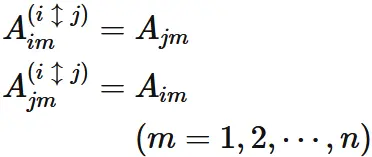 The determinant of
$A^{(i \hspace{1mm}\updownarrow \hspace{1mm}j)}$ is
The determinant of
$A^{(i \hspace{1mm}\updownarrow \hspace{1mm}j)}$ is
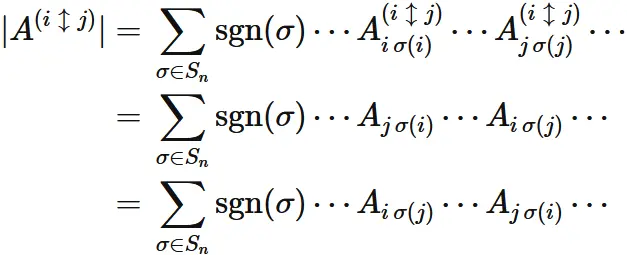 $$
\tag{1.4}
$$
Here,
the last line only changes the order of multiplication.
$$
\tag{1.4}
$$
Here,
the last line only changes the order of multiplication.
Let $\xi$ be a permutation that swaps $\sigma(i)$ and $\sigma(j)$:
 $$
\tag{1.5}
$$
For example,
if $\sigma$ is
$$
\tag{1.5}
$$
For example,
if $\sigma$ is
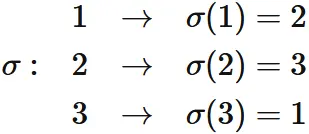 and if $\xi$ swaps $\sigma(1)$ and $\sigma(3)$,
then
and if $\xi$ swaps $\sigma(1)$ and $\sigma(3)$,
then
 Using $(1.5)$,
$(1.4)$ can be expressed as
Using $(1.5)$,
$(1.4)$ can be expressed as
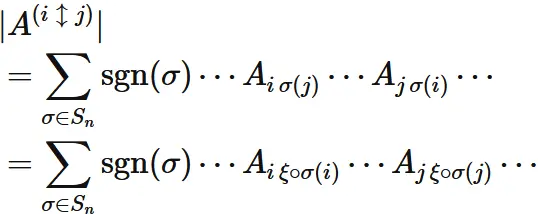 $$
\tag{1.6}
$$
The permutation $\xi$ is an odd permutation
because it swaps only once.
Therefore,
if $\sigma$ is an even permutation,
the composite permutation $\xi \circ \sigma(\cdot)$
is an odd permutation,
and if $\sigma$ is an odd permutation,
the composite permutation $\xi \circ \sigma(\cdot)$
is an even permutation.
We therefore see that
$$
\tag{1.6}
$$
The permutation $\xi$ is an odd permutation
because it swaps only once.
Therefore,
if $\sigma$ is an even permutation,
the composite permutation $\xi \circ \sigma(\cdot)$
is an odd permutation,
and if $\sigma$ is an odd permutation,
the composite permutation $\xi \circ \sigma(\cdot)$
is an even permutation.
We therefore see that
 $(1.3)$ and this give
$(1.3)$ and this give
 holds for any permutation $\sigma$.
Using this, $(1.6)$ can be written as
holds for any permutation $\sigma$.
Using this, $(1.6)$ can be written as
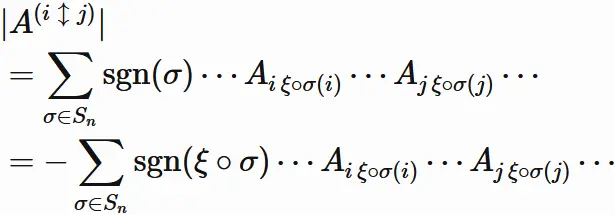 $$
\tag{1.7}
$$
The permutation $\sigma$ is a mapping that only changes the order of the set
$
\{1,2,\cdots,n\}.
$
For example, if $n=3$,
all the permutations $\sigma$ are
$$
\tag{1.7}
$$
The permutation $\sigma$ is a mapping that only changes the order of the set
$
\{1,2,\cdots,n\}.
$
For example, if $n=3$,
all the permutations $\sigma$ are
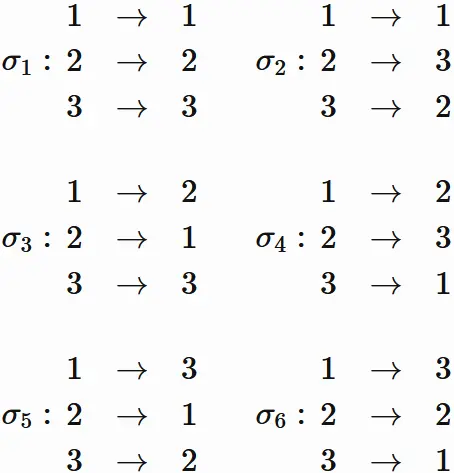 If $\xi$ swaps $\sigma(1)$ and $\sigma(3)$,
all the composite permutations $\xi \circ \sigma $ are
If $\xi$ swaps $\sigma(1)$ and $\sigma(3)$,
all the composite permutations $\xi \circ \sigma $ are
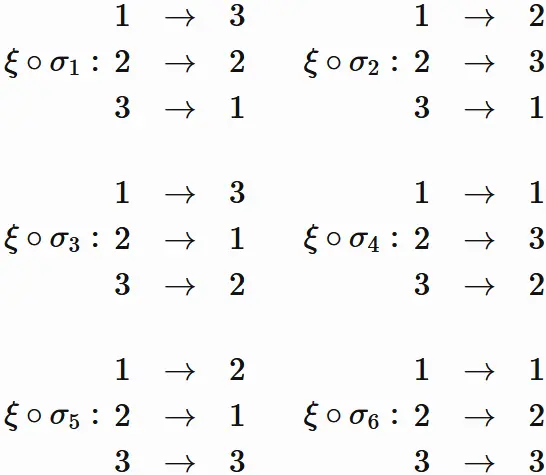 As seen this example,
the composite permutation $\xi \circ \sigma$ is also a mapping that only changes the order.
And
the set
As seen this example,
the composite permutation $\xi \circ \sigma$ is also a mapping that only changes the order.
And
the set
 is identical to the set
is identical to the set
 Therefore,
the summation
$\sum_{\sigma \in S_{n}}$ in $(1.7)$
can be replaced with
$\sum_{\xi \circ \sigma \in S_{n}}$:
Therefore,
the summation
$\sum_{\sigma \in S_{n}}$ in $(1.7)$
can be replaced with
$\sum_{\xi \circ \sigma \in S_{n}}$:
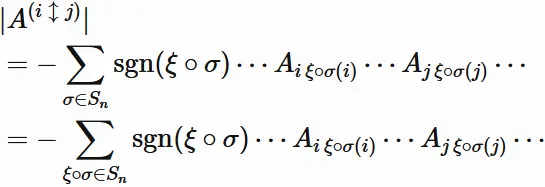 Let $\tau$
be
$\xi \circ \sigma$. We have
Let $\tau$
be
$\xi \circ \sigma$. We have
 The right hand side is equal to -$|A|$.
So we obtain
The right hand side is equal to -$|A|$.
So we obtain

● $| A^{(i \leftrightarrow j)} | = -|A|$
First, applying the same discussion as above to the transposed matrix $A^{T}$ , we have
 Generally,
a matrix transposed after swapping columns
is equal to a matrix swapping rows after transpose:
Generally,
a matrix transposed after swapping columns
is equal to a matrix swapping rows after transpose:
 We obtain
We obtain
 Finally,
the matrix transpose property ( $|A^{T}| = |A|$)
gives
Finally,
the matrix transpose property ( $|A^{T}| = |A|$)
gives

● $| A^{(i\hspace{1mm} \updownarrow \hspace{1mm}j)} | = -|A|$
Let $A_{kl}$ be the $k$-th row and $l$-th column element of an $n \times n$ matrix of $A$. The determinant of $A$ is





Let $\xi$ be a permutation that swaps $\sigma(i)$ and $\sigma(j)$:














● $| A^{(i \leftrightarrow j)} | = -|A|$
First, applying the same discussion as above to the transposed matrix $A^{T}$ , we have




Case two columns are equal
Let
$\mathbf{a}_{i}$
and
$\mathbf{a}_{j}$
$(i \neq j)$
denote the $i$-th and $j$-th column vectors of an $n \times n$ matrix $A$,
respectively,
and denote $A$ as


Proof
Let $A^{(i\leftrightarrow j)}$ be a matrix given by swapping the $i$-th and $j$-th columns of $A$.
 By $(1.1)$, we have
By $(1.1)$, we have
 $$
\tag{2.2}
$$
If
$
\mathbf{a}_{i} = \mathbf{a}_{j}
$
,
$$
\tag{2.2}
$$
If
$
\mathbf{a}_{i} = \mathbf{a}_{j}
$
,
 In this case,
swapping the $i$-th and $j$-th column vectors does not change the matrix..
In this case,
swapping the $i$-th and $j$-th column vectors does not change the matrix..
 Eq. $(2.2)$ and this give
Eq. $(2.2)$ and this give
 We obtain
We obtain

Let $A^{(i\leftrightarrow j)}$ be a matrix given by swapping the $i$-th and $j$-th columns of $A$.






Case two rows are equal
Let
$\mathbf{a}_{i}$
and
$\mathbf{a}_{j}$
$(i \neq j)$
denote the $i$-th and $j$-th row vectors of an $n \times n$ matrix $A$,
respectively,
and denote $A$ as
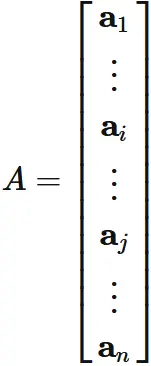

Proof
Let $A^{(i\hspace{1mm}\updownarrow\hspace{1mm} j)}$ be a matrix given by swapping the $i$-th and $j$-th rows of $A$.
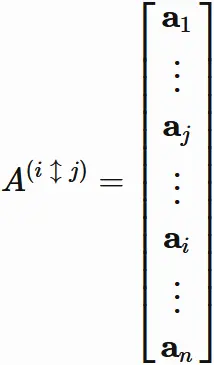 Its determinant differs from the original determinant
only in sign
(see the above).
Its determinant differs from the original determinant
only in sign
(see the above).
 $$
\tag{3.2}
$$
If
$\mathbf{a}_{i} = \mathbf{a}_{j}$,
$$
\tag{3.2}
$$
If
$\mathbf{a}_{i} = \mathbf{a}_{j}$,
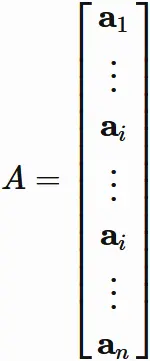 In this case,
swapping the $i$-th and $j$-th rows does not change the matrix.
Therefore
In this case,
swapping the $i$-th and $j$-th rows does not change the matrix.
Therefore
 Eq. $(3.2)$ and this give
Eq. $(3.2)$ and this give
 We obtain
We obtain

Let $A^{(i\hspace{1mm}\updownarrow\hspace{1mm} j)}$ be a matrix given by swapping the $i$-th and $j$-th rows of $A$.






Case if a row is scalar-multiplied
Let $A_{ij}$
be the $i$-th row
and $j$-th column element of an $n \times n$ matrix $A$:
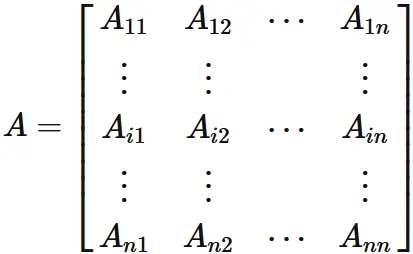
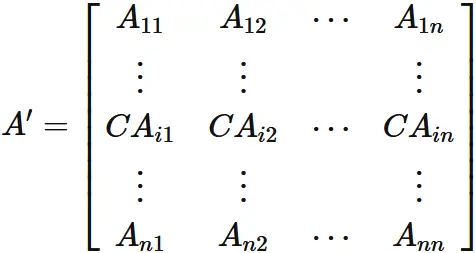

Proof
Let $A'_{ij}$ be the $i$-th row and $j$-th column element of $A$. The determinant of $A'$ is
 (See definition of determinant).
By $(4.1)$ and $(4.2)$,
we have
(See definition of determinant).
By $(4.1)$ and $(4.2)$,
we have
 Therefore we obtain
Therefore we obtain
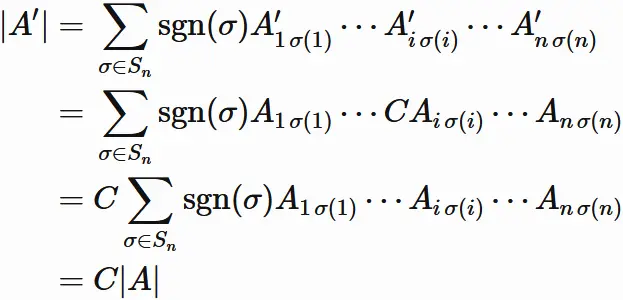
Let $A'_{ij}$ be the $i$-th row and $j$-th column element of $A$. The determinant of $A'$ is



Case if a column is scalar-multiplied
Let $A_{ij}$
be the $i$-th row
and $j$-th column element of an $n \times n$ matrix $A$:
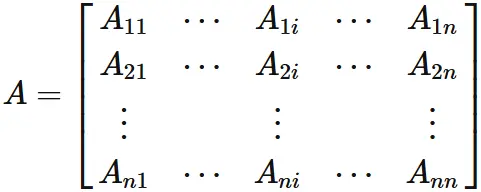
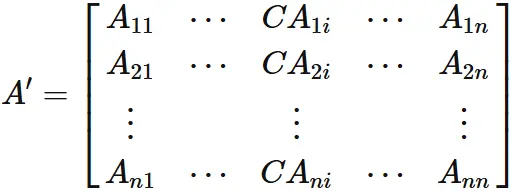

Proof
Since the determinant of transpose of $A$ is equal to the determinant of $A$ , we have
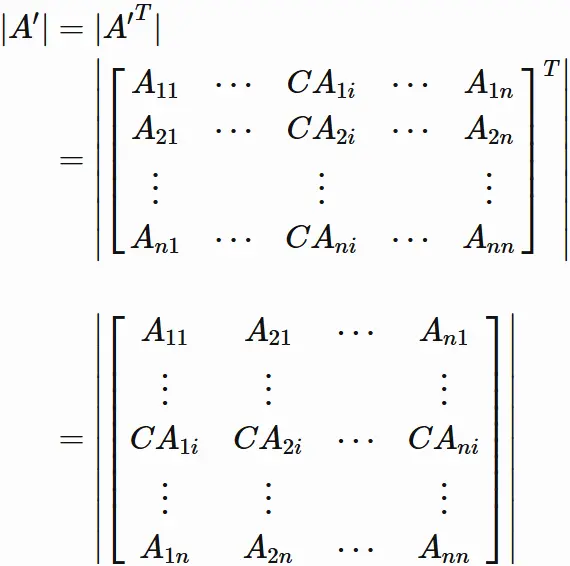 By
(4.3),
we obtain
By
(4.3),
we obtain
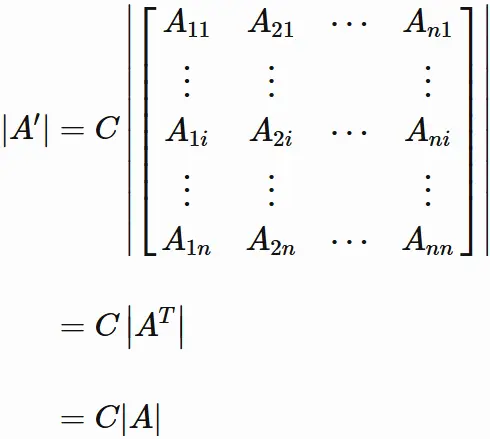
Since the determinant of transpose of $A$ is equal to the determinant of $A$ , we have


Case if a scalar is multiplied
Let $A$ be an $n \times n$ matrix.
The determinant of $A$ multiplied by a scaler $\alpha$
is $\alpha^n$ times the determinant of $A$.

Proof
By definition of determinant, the determinant of $A$ is
 where $A_{ij}$ is the $i$-th row and $j$-th column element of $A$,
$\sigma$ is the permutation,
$S_{n}$ is
the set of all the permutations,
and
$\mathrm{sgn}(\sigma)$ is the sign of permutation.
where $A_{ij}$ is the $i$-th row and $j$-th column element of $A$,
$\sigma$ is the permutation,
$S_{n}$ is
the set of all the permutations,
and
$\mathrm{sgn}(\sigma)$ is the sign of permutation.
In the same way, the determinant of $\alpha A$ is
 Therefore, we obtain
Therefore, we obtain

By definition of determinant, the determinant of $A$ is

In the same way, the determinant of $\alpha A$ is


Case if a row vector is sum
Let $A$ be an $n \times n$ matrix,
and $\mathbf{a}_{i}$ be the $i$-th row vector of $A$.
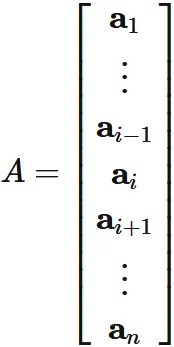


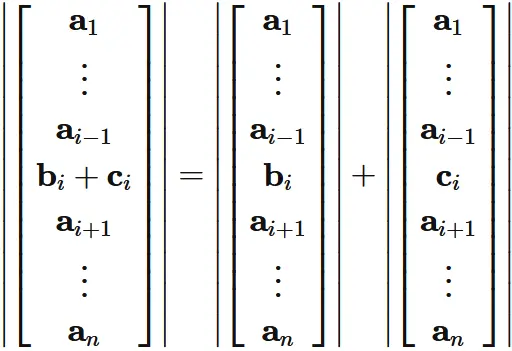
Proof
From $(7.1)$ and $(7.2)$, the determinants of $|A|$, $|B|$, and $|C|$ are
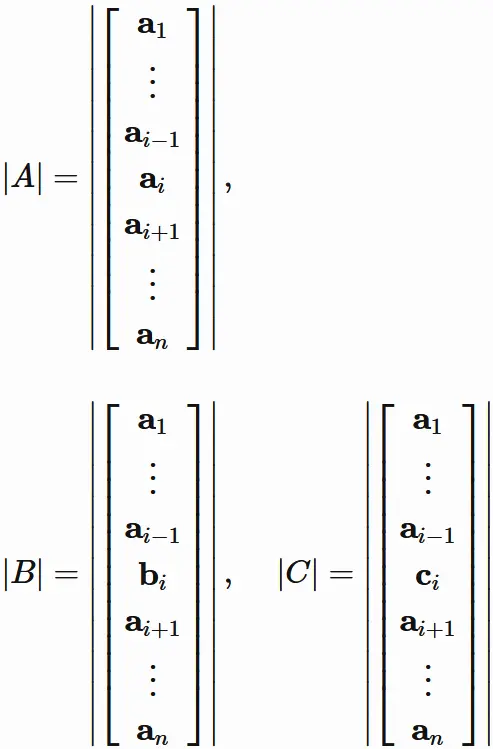 Let
$A_{ij}$,
$B_{ij}$,
and
$C_{ij}$
be the $i$-th row and $j$-th column element of $A$, $B$, and $C$, respectively.
By definition,
the determinants are
Let
$A_{ij}$,
$B_{ij}$,
and
$C_{ij}$
be the $i$-th row and $j$-th column element of $A$, $B$, and $C$, respectively.
By definition,
the determinants are
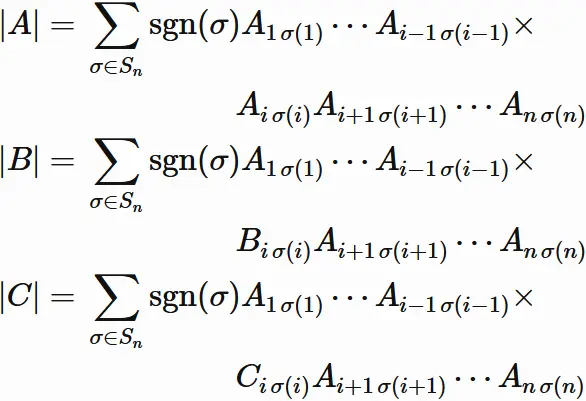 From $(7.3)$, we have
From $(7.3)$, we have
 We see that
the determinant of $|A|$ can be written as
We see that
the determinant of $|A|$ can be written as
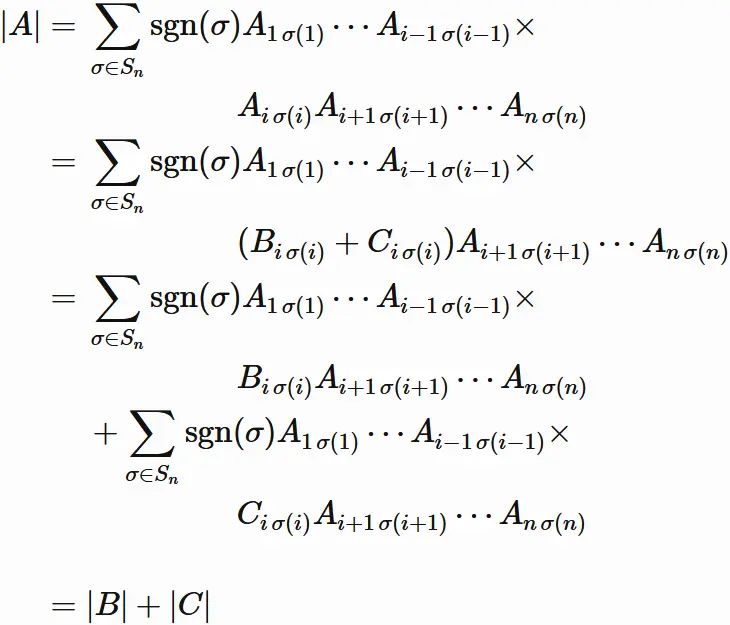 We have
We have

From $(7.1)$ and $(7.2)$, the determinants of $|A|$, $|B|$, and $|C|$ are





Case if a column vector is sum
Let $A$ be an $n \times n$ matrix,
and $\mathbf{a}_{i}$ be the $i$-th column vector of $A$.



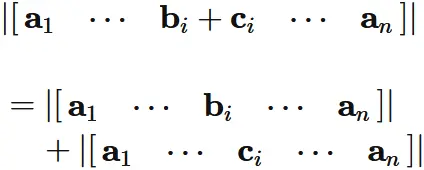
Proof
By $(8.3)$, we have
 Since the determinant of the transposed matrix
is equal to the determinant of the original matrix,
we have
Since the determinant of the transposed matrix
is equal to the determinant of the original matrix,
we have
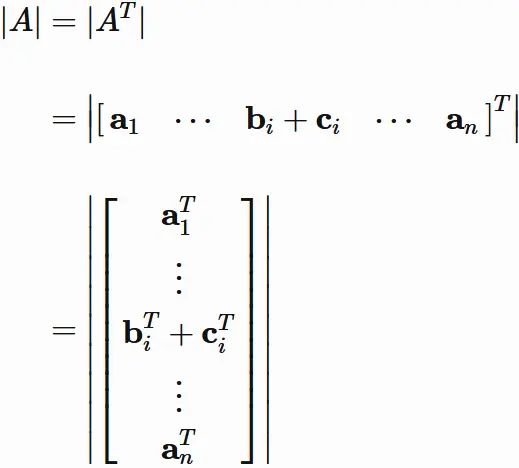 Here,
$\mathbf{b}_{i}^{T} + \mathbf{c}_{i}^{T}$
is the $i$-th row vector of $A^{T}$.
By $(7.4)$,
we have
Here,
$\mathbf{b}_{i}^{T} + \mathbf{c}_{i}^{T}$
is the $i$-th row vector of $A^{T}$.
By $(7.4)$,
we have
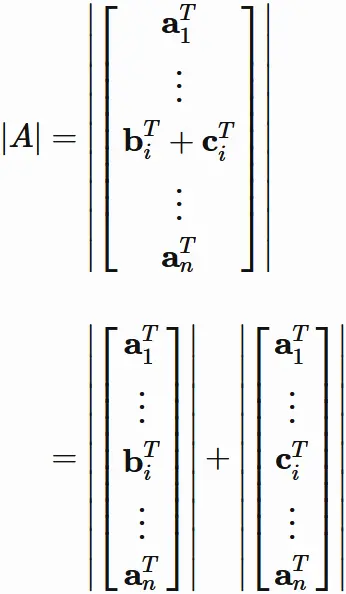 For the determinant of each term on the right side,
we use again the property that
the determinant of the transposed matrix
is equal to the determinant of the original matrix, and obtain
For the determinant of each term on the right side,
we use again the property that
the determinant of the transposed matrix
is equal to the determinant of the original matrix, and obtain
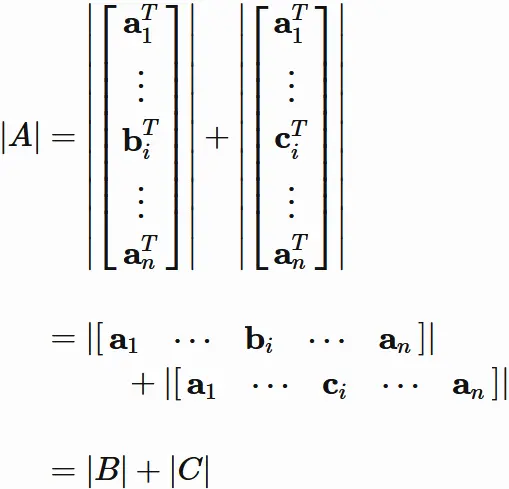
By $(8.3)$, we have




Add one row to another
Let $A$ be an $n \times n$ matrix,
and $\mathbf{a}_{i}$ be the $i$-th row vector of $A$.
Let $A'$ be an $n \times n$ matrix given by adding the scalar multiple of $j$-th row vector of $A$ to $A$:
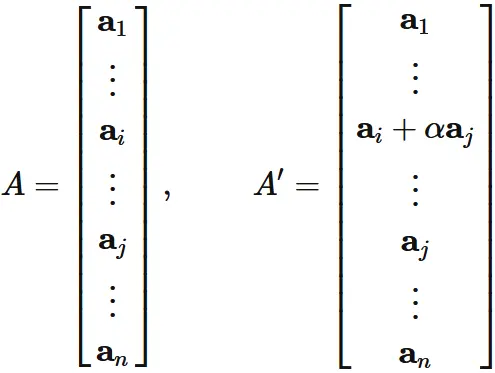

Proof
By (7.4), we have
 Applying $(4.3)$ and $(3.1)$ to the second term of the righthand side,
we have
Applying $(4.3)$ and $(3.1)$ to the second term of the righthand side,
we have
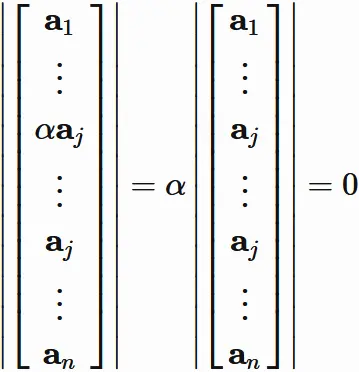 Therefore we obtain
Therefore we obtain

By (7.4), we have



Case if the 1st column is 1000...
Let $A$ be
an $n \times n$
matrix whose elements after the second element in the first column are all $0$:

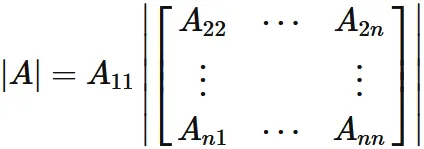
Proof
The determinant of $A$ is
 $$
\tag{10.3}
$$
where $ A_{ij}$ $(i,j=1,2,\cdots,n)$ is
the $i$-th row and $j$-th column element of $A$,
$\sigma$ is the permutation,
$S_{n}$ is
the set of all the permutations,
and
$\mathrm{sgn}(\sigma)$ is the sign of permutation (See "Determinant definition").
$$
\tag{10.3}
$$
where $ A_{ij}$ $(i,j=1,2,\cdots,n)$ is
the $i$-th row and $j$-th column element of $A$,
$\sigma$ is the permutation,
$S_{n}$ is
the set of all the permutations,
and
$\mathrm{sgn}(\sigma)$ is the sign of permutation (See "Determinant definition").
Let us write $(10.3)$ by dividing it into the summation for $\sigma(1) = 1$ and the summation for $\sigma(1)\neq 1$.
 $$
\tag{10.4}
$$
Since the permutation $\sigma$ is a one-to-one mapping from $\{1,2,⋯,n \}$ to $\{1,2,⋯,n \}$,
if $\sigma(1) \neq 1$,
any one of the integers from $2$ to $n$
satisfies
$\sigma(k) = 1$.
For such $k$ ,
we have
$$
\tag{10.4}
$$
Since the permutation $\sigma$ is a one-to-one mapping from $\{1,2,⋯,n \}$ to $\{1,2,⋯,n \}$,
if $\sigma(1) \neq 1$,
any one of the integers from $2$ to $n$
satisfies
$\sigma(k) = 1$.
For such $k$ ,
we have
 $$
\tag{10.5}
$$
By $(10.1)$,
$$
\tag{10.5}
$$
By $(10.1)$,
 We have
We have
 and
and
 This and $(10.4)$ give
This and $(10.4)$ give
 $$
\tag{10.6}
$$
Let $B$ an $(n-1)\times(n-1)$ matrix defined as
$$
\tag{10.6}
$$
Let $B$ an $(n-1)\times(n-1)$ matrix defined as
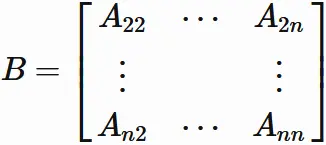 and $B_{ij}$ be
the $i$-th row and $j$-th column element of $B$.
We have
and $B_{ij}$ be
the $i$-th row and $j$-th column element of $B$.
We have
 Using this,
$(10.6)$ can be written as
Using this,
$(10.6)$ can be written as
 Let
$\sigma'$ be a map defined as
Let
$\sigma'$ be a map defined as
 $$
\tag{10.7}
$$
We have
$$
\tag{10.7}
$$
We have
 Under the condition
$\sigma(1)=1$,
$\sigma$ is a one-to-one map from $\{2,3,\cdots,n \}$ to $\{2,3,\cdots,n \}$.
By $(10.7)$,
$\sigma'$ is a one-to-one map from
$\{1,2,\cdots,n-1 \}$
to
$\{1,2,\cdots,n-1 \}$.
So, $\sigma'$ is a permutation of $\{1,2,\cdots,n-1 \}$ (see "Determinant definition").
We see that
Under the condition
$\sigma(1)=1$,
$\sigma$ is a one-to-one map from $\{2,3,\cdots,n \}$ to $\{2,3,\cdots,n \}$.
By $(10.7)$,
$\sigma'$ is a one-to-one map from
$\{1,2,\cdots,n-1 \}$
to
$\{1,2,\cdots,n-1 \}$.
So, $\sigma'$ is a permutation of $\{1,2,\cdots,n-1 \}$ (see "Determinant definition").
We see that
 where $S_{n-1}$ is the set of all the permutations.
By $(10.7)$,
$\sigma'$ is an even permutation,
if $\sigma$ is an even permutation.
And
$\sigma'$ is an odd permutation,
if $\sigma$ is an odd permutation.
Hence the permutation sign of $\sigma'$ is equal to the permutation sign of $\sigma$:
$
\mathrm{sgn}(\sigma) = \mathrm{sgn}(\sigma').
$
We have
where $S_{n-1}$ is the set of all the permutations.
By $(10.7)$,
$\sigma'$ is an even permutation,
if $\sigma$ is an even permutation.
And
$\sigma'$ is an odd permutation,
if $\sigma$ is an odd permutation.
Hence the permutation sign of $\sigma'$ is equal to the permutation sign of $\sigma$:
$
\mathrm{sgn}(\sigma) = \mathrm{sgn}(\sigma').
$
We have
 The summation of the right-hand side is the determinant of $B$.
We obtain
The summation of the right-hand side is the determinant of $B$.
We obtain
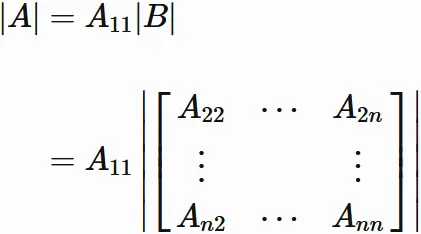
The determinant of $A$ is

Let us write $(10.3)$ by dividing it into the summation for $\sigma(1) = 1$ and the summation for $\sigma(1)\neq 1$.













